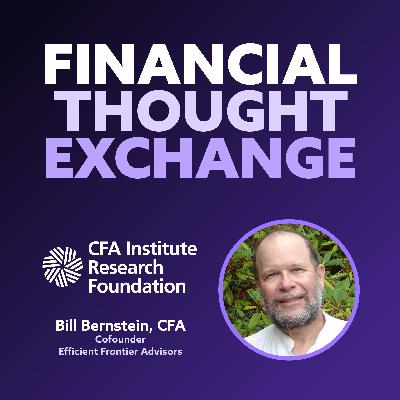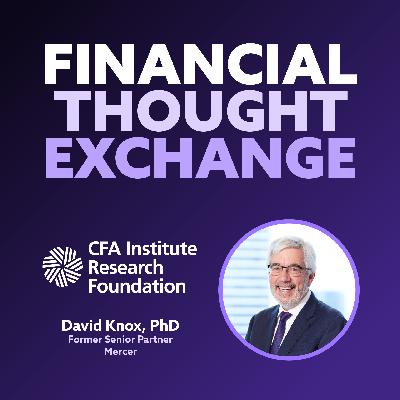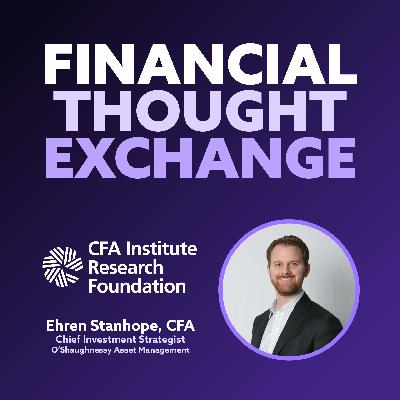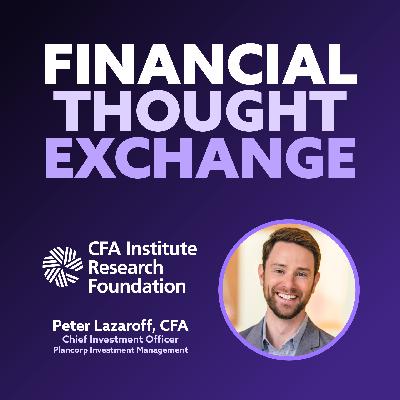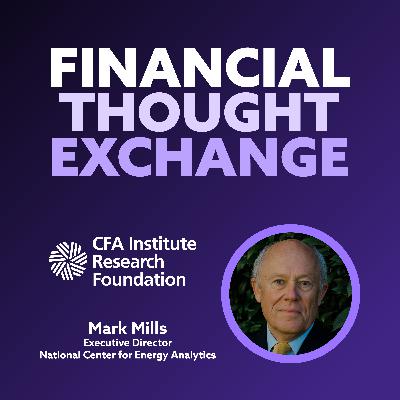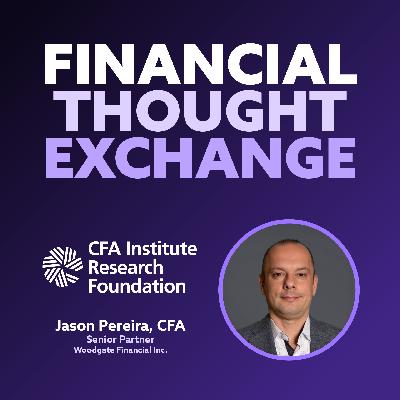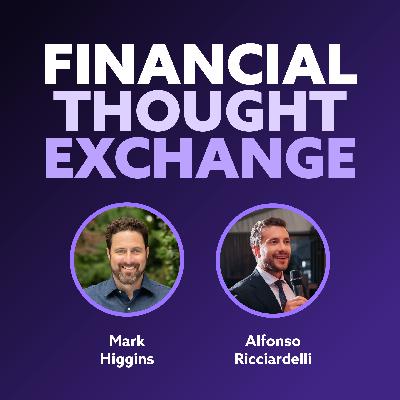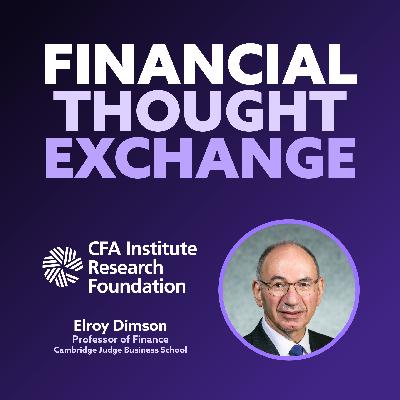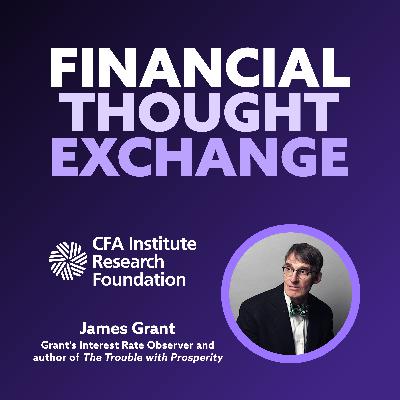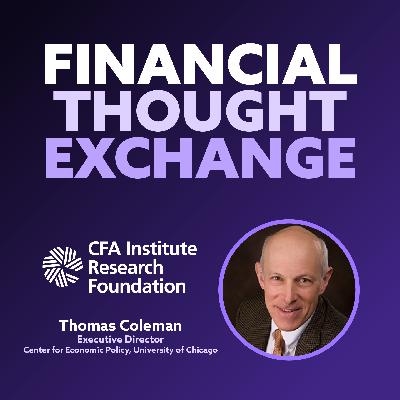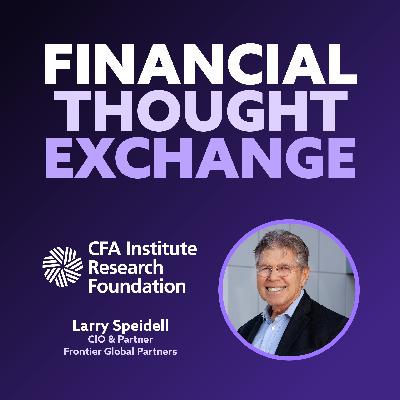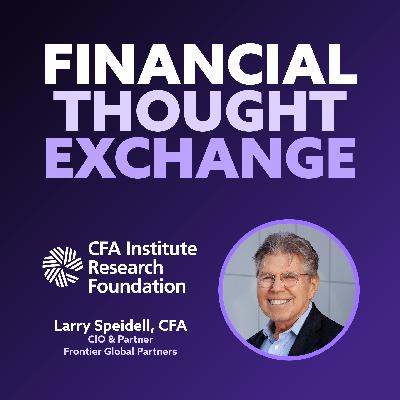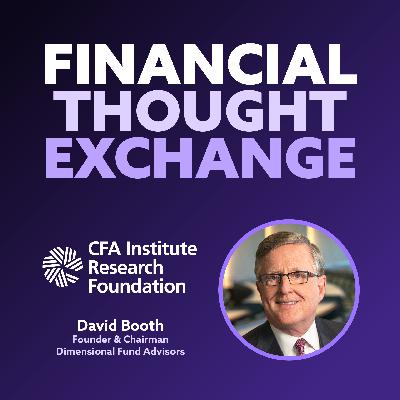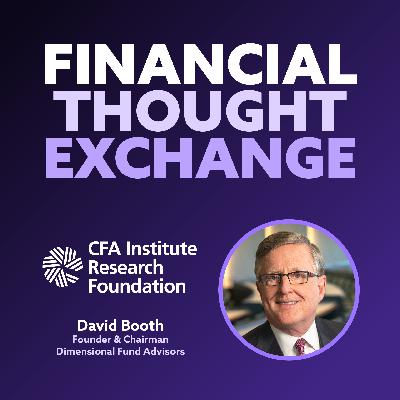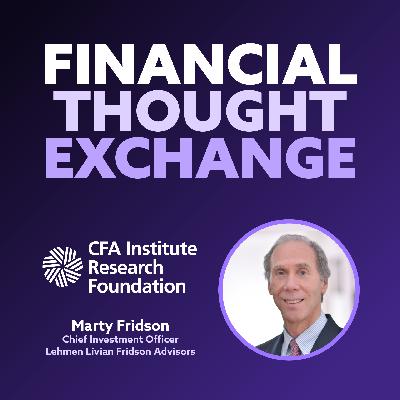Discover Financial Thought Exchange Podcast
Financial Thought Exchange Podcast

Financial Thought Exchange Podcast
Author: CFA Institute Research Foundation
Subscribed: 2Played: 0Subscribe
Share
© Copyright 2025 CFA Institute Research Foundation. All rights reserved.
Description
The Financial Thought Exchange Podcast offers listeners invaluable insights from top financial thought leaders across various sectors. Whether you're a financial analyst, investor, or simply interested in the "inside baseball" of the financial world, this podcast provides access to some of the most influential people shaping the industry.
Brought to you by the CFA Institute Research Foundation, the Financial Thought Exchange is your go-to resource for staying informed and gaining a deeper understanding of the finance industry's most pressing topics. Tune in for interviews with industry pioneers, expert analyses, and actionable insights you can apply in your own financial journey.
Financial Thought Exchange is the official podcast and video channel of the CFA Institute Research Foundation.
Check out our peer-reviewed research here: https://rpc.cfainstitute.org/en/research
Brought to you by the CFA Institute Research Foundation, the Financial Thought Exchange is your go-to resource for staying informed and gaining a deeper understanding of the finance industry's most pressing topics. Tune in for interviews with industry pioneers, expert analyses, and actionable insights you can apply in your own financial journey.
Financial Thought Exchange is the official podcast and video channel of the CFA Institute Research Foundation.
Check out our peer-reviewed research here: https://rpc.cfainstitute.org/en/research
41 Episodes
Reverse
Larry Siegel speaks with Dr. William J. Bernstein—author, neurologist, and investment thinker—about the pillars of prosperity: property rights, scientific rationalism, capital markets, and infrastructure. They examine cultural influences on economic growth, the Henrich hypothesis on trust, and the future of globalization. Bernstein shares his philosophy on passive investing, liability-matching portfolios, and why TIPS matter for retirees. He also previews a new book with Ed McQuarrie that challenges assumptions about long-term stock returns. A deep dive into history, markets, and strategies for financial security.
In this episode of the Financial Thought Exchange podcast, host Lotta Moberg, CFA, PhD, speaks with David Knox, PhD, former senior partner at Mercer and author of the Research Foundation brief De-risking Global Pension Systems. Knox explores the complexities of global pension structures, the shift from defined benefit to defined contribution plans, and the growing reliance on private pensions. He discusses demographic pressures, funding challenges, and the importance of governance, regulation, and communication in securing retirement outcomes. A timely conversation for professionals navigating the future of pension policy and retirement planning.
Sébastien Page, CFA, Head of Global Multi-Asset and CIO at T. Rowe Price, joins the FTE Podcast to explore the intersection of leadership psychology and investment strategy. Drawing from his books Beyond Diversification and The Psychology of Leadership, Page shares how storytelling enhances financial education, the importance of resilience in investing, and how personality traits like openness and agreeableness shape portfolio management. He also reflects on goal-induced blindness, the underrated skill of quitting, and the deeper meaning behind active management. A must-listen for finance professionals and aspiring leaders.
Ehren Stanhope, CFA of O'Shaughnessy Asset Management explains how custom indexing builds on direct indexing by integrating tax loss harvesting, ESG preferences, and quantitative equity factors. He discusses how platforms like Canvas enable personalized portfolio construction while maintaining benchmark alignment. Stanhope also shares insights on the implications of rising interest rates, inflation, and changing asset correlations for long-term investment strategy and risk management.
Marlena Lee, Global Head of Investment Solutions at Dimensional Fund Advisors, explains how her team bridges investment research with client needs through systematic, evidence-based approaches. Rather than chasing short-term market moves or stock-picking, Dimensional builds portfolios grounded in decades of academic research and practical data analysis. Lee highlights how the firm evaluates traditional factors—such as size, value, and profitability—while carefully testing new ideas to avoid data-mined results. She underscores the importance of looking beyond simple measures like correlations or Sharpe ratios, encouraging investors to dig deeper into underlying holdings, factor overlaps, and global perspectives. From the challenges of timing premiums to the distortions caused by mega-cap stocks, Lee emphasizes the value of strategic, long-term allocations over tactical shifts. Her remarks offer clarity on what true diversification means and how investors can navigate trade-offs between tracking error and long-term outperformance.
Welcome to the Financial Thought Exchange, where we bring you insights from the brightest minds in finance! In this episode, recorded live from the CFA Institute Annual Conference in Chicago, we are honored to sit down with Peter Lazaroff. Peter is the author of "Making Money Simple" and the Chief Investment Officer at Plancorp Wealth Management, overseeing $7 billion in AUM. He is also the host of the fantastic "Long Term Investor" podcast. In this deep dive, Peter shares his key takeaways from a panel on decoding investor behavior. We discuss how behavioral finance goes beyond just identifying biases, moving towards strategies that truly help clients feel more confident and content with their financial decisions. We cover: The evolution of behavioral finance and its practical application in wealth management. How to tailor financial education across different generations, from Baby Boomers to Millennials. The distinct approaches to advice for inherited vs. self-made wealth, and why empathy is crucial. Peter's firm's philosophy of avoiding mistakes over chasing perfect returns, and the biggest "mistake" he focuses on mitigating: setting the wrong expectations. The role of risk aversion in portfolio design and how Plancorp customizes strategies based on a client's stock/bond split and liquidity profile. Why, despite advancements in behavioral finance, human errors will persist, and how technology might assist without replacing the essential human connection in financial advice. Join us for a candid and insightful conversation that will change how you think about client relationships and investment strategy!
In this podcast episode, Mark Mills, a physicist, energy expert, and "tech guru," argues that the hype around AI is justified but misunderstood, emphasizing its roots in statistical inference (which is not what humans do when they think). He explains that AI's strength lies in handling fuzzy, human-like tasks, unlike traditional computing's whiz-bang ability to calculate. This making AI transformative for automation. Mills addresses concerns about AI displacing jobs, noting that automation historically eliminates some roles but creates others, with 60% of 1960s job categories gone by 2020, yet employment and wages rose. He predicts AI, combined with advancements in materials and machines, will drive a massive productivity boom over the very long run, akin to previous industrial revolutions like the 1920s. He notes that the universe is made up of only three things—matter, energy, and information—and that all three are undergoing simultaneous revolutions, a historically rare event.
In this episode of Financial Thought Exchange, host Larry Siegel interviews Mark Mills, a physicist turned energy and tech expert. Mills argues that there has never been a true energy transition, except for abandoning whale oil. Even as we pursue an energy transition, humanitycontinues to rely on traditional energy sources such as hydrocarbons, wood, even animal power. Mills criticizes the slow adoption of nuclear energy, attributing it to public fears and stringent regulation. He sees promise in new small reactor designs, such as molten salt reactors, while traditional reactor designs suffer from regulatory and technical constraints. Mills uses the snail darter (which, it turns out, doesn't exist) as an example of environmental policy gone amuck, hindering growth. He asks that policies weigh environmental considerations against the need for economic development. Mills emphasizes the need for affordable energy to support technologies like air conditioning in developing nations, noting that only increased wealth and advanced technology can achieve the resilience against climate challenges that we need.
In this episode of the Financial Thought Exchange podcast, Jason Pereira, host of the Fintech Impact Podcast and an advisor to technology and AI startups, delves into the evolving landscape of robo-advisors and the revolutionary impact of Artificial Intelligence (AI) in wealth management.
A lively debate on the state of the private credit market, recorded live from the CFA Institute Annual Conference! Financial historian Mark Higgins and alternative investment strategist Alfonso Ricciardelli face off on a critical question of whether the massive influx of capital into private credit is a dangerous bubble or a new, permanent structural shift. Hosted by Lotta Moberg, this panel explores the risks of "herd behavior," the importance of setting realistic investor expectations, and the vast alpha opportunities in underserved markets. Mark shares historical context, while Alfonso provides a structural counterpoint. This discussion is essential for anyone seeking to understand the future of alternative investments and the crucial role of manager selection.
Elroy Dimson and Larry Siegel discuss the origins of long-term investing by medieval universities, then move to rates of return, both past and future, on stocks versus bonds – there are some surprises in the older data suggesting the equity risk premium may not be as high as it appears. Dimson recounts his involvement with long-term investors such as the Norwegian sovereign wealth fund, and presents lessons for the future. He concludes with "curiosity assets" such as wine, art, and postage stamps. (You should not invest in postage stamps.)
Elroy Dimson, who co-authored the first very long-term study of worldwide asset returns, explains to Larry Siegel how he was inspired by Roger Ibbotson to research the topic. Then, he and Larry discuss the relative merits of investing in the United States, other developed markets, and emerging markets as their economies have evolved. While U.S. stocks now form the dominant market in the world, that has not always been the case and may not be in the future. Dimson concludes by recalling how World War II reshaped the world's capital markets and set the stage for the economic boom that followed.
This episode of the Financial Thought Exchange Podcast features a discussion between host Lotta Moberg and James Grant, founder and editor of Grant's Interest Rate Observer. They explore the U.S. fiscal situation, potential default scenarios, and the implications for interest rates and bonds, highlighting the complexities of fiscal dominance and historical precedents in U.S. monetary policy. This episode is the second of a two-part series. Check out the previous one, which focused on the fundamentals of interest rates.
In the Financial Thought Exchange podcast, host Lotta Moberg interviews James Grant, founder and editor of Grant's Interest Rate Observer, about interest rates and their fundamental nature. They dig into the fundamental nature of interest rates and how they reflect scarcity, opportunity cost, and the human tendency to prioritize immediate gratification over future benefits. The discussion also touches on the complexities of credit risk and the historical context of interest rates. This episode is the first of a two-part series, with the next focusing on U.S. debt and potential defaults.
Thomas Coleman, an economics professor at the University of Chicago, discusses a novel theory of money and inflation, inequality, and risk management with the CFA Institute Research Foundation's Larry Siegel. The "money" referred to in monetary economics is a thing of the past, says Tom, because nobody has any "money" (cash, checking accounts, savings accounts). They have marketable assets instead. So monetarism is outdated as a theory of inflation. Instead, Tom argues inflation is better explained by the Fiscal Theory of the Price Level (FTPL), which relates the price level to the value of government-issued securities (bonds and cash) as determined by the cash flows backing them. These cash flows are taxes minus government spending. The FTPL explains the low inflation of 2008 and high inflation of 2022 better than any other theory. Coleman also discusses inequality. While conventional measures of inequality look at taxable incomes, he takes a broader view, including transfer payments and other items not reported on tax returns as income. When you do this, inequality – while still worse than in the 1980s – is less severe than it appears. In fact, households in the bottom half of the income distribution face a tax rate that is negative! Tom concludes with thoughts on risk, a topic on which he has written two excellent books.
In this two-part episode, Lawrence Speidell, founder and CIO of Frontier Global Partners, discusses his Indiana Jones-like foray into frontier markets in search of stocks to buy for his firm's clients. Frontier markets are countries that are less developed than those in emerging market indexes. Larry's interest in frontier markets began during a lecture trip to China in the 1980s. Frontier markets include Vietnam, Bangladesh, Romania, Colombia, and many countries in Africa. Speidell argues that, despite political instability, such markets are not necessarily riskier than developed ones, which have also seen increasing volatility. Frontier markets, he says, are highly varied with a low correlation to developed markets, so they are a good diversifier. While frontier-market economies are a significant share of global GDP, their stock markets remain underdeveloped. Speidell believes this gap will close over time, offering long-term investment opportunities. Progress in frontier markets is slow, however, and requires patience, which Speidell argues is a good approach to investing generally.
In this second episode segment, Larry Speidell, founder and CIO of Frontier Global Partners focuses on personal stories, travel experiences, and deeper insights into frontier markets. For example, Speidell praises Botswana's development, aided by diamond discoveries, but also discusses the "resource curse," where reliance on natural resources can hinder broader economic growth. Speidell's firm does not shy away from politically unstable countries such as Peru and Georgia. In such environments, he says, strong companies can thrive, and investors must be patient. Larry describes the transformative impact of mobile technology in frontier markets, such as Kenya's M-PESA, a banking app that greatly helps the previously "unbanked" to make a living. The episode blends investment insights with cultural reflections, emphasizing patience, optimism, and the human side of global investing.
In Part 2, David Booth reflects on how Dimensional Fund Advisors expanded by partnering with fee-only financial advisors, helping to bring academic investing principles to individual clients. He emphasizes the importance of low fees both in appealing to personal investors and in delivering superior results to them. Booth discusses how his collaboration with leading finance professors led him to regard the University of Chicago as a business partner and describes his gift to the school as a "partnership distribution."
David Booth, one of the best-known investors in the world, founded Dimensional Fund Advisors (DFA) along with Rex Sinquefield and brought asset-class investing, a description that embraces both index funds and the index-based but value-added strategy that DFA pursues, to individual investors as well as institutions. David, who received a PhD from the University of Chicago's Graduate School of Business, also made the largest donation in the University of Chicago's history and, in recognition of that gift, the university renamed its business school the Booth School of Business. In building DFA, David pioneered the use of finance academics as advisors and board members. Eugene Fama, the Nobel Prize-winning economist associated with the efficient market hypothesis, was his dissertation chairman, an early investor in DFA, and a current director of the firm. Other noted academics associated with the firm include Robert Merton, Roger Ibbotson, and Kenneth French. In Part 1 of his interview, Booth joins Larry Siegel to reflect on the academic revolution that reshaped investing, the launch of Dimensional's first small-cap strategies, and the challenges of selling a new idea to skeptical markets at a time when index and index-like funds were in its infancy. He shares stories from the University of Chicago's golden age of financial economics and explains why investing in an index with an eye to adding value through trading and inventory management – not strictly passive indexing – became Dimensional's guiding philosophy.
In this episode of the Financial Thought Exchange podcast, host Lotta Moberg, CFA, and Marty Fridson, CIO at Lehman Livian Friedson Advisors, delve into the complexities of financial statements and corporate reporting. They discuss how companies often present financial health to their advantage, using Fridson's book, "Financial Statements," as a guide. The conversation covers regulatory impacts, the role of goodwill in valuation, and the challenges of assessing acquisitions. Fridson emphasizes the importance of critical analysis and cash flow generation in valuing companies, providing insights into navigating financial reporting pitfalls.


